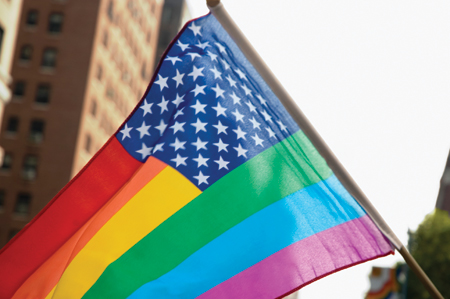Students Spearhead Curriculum Change
Student leadership matters at Hopkins, where a student-led initiative has resulted in a modification of the nursing curriculum. In October, the school’s baccalaureate curriculum committee unanimously passed a proposal to address the health disparities affecting the lesbian, gay, bisexual, transgender (LGBT) population due to a lack of culturally prepared nurses.
“Sexual identity is still a touchy issue in our society, entrenched in social and religious norms,” notes Marcella Leath, traditional ’11, who helped spearhead the curriculum change. “Of all disciplines, healthcare professionals should be most accepting of all people and aware of the potential issues that arise from sexual diversity.”
Classmate Joanne Arellano agrees. She self-identifies as “queer,” an umbrella term for a myriad of minority sexual orientations and gender identities. “My gender presentation is on the feminine side, so people don’t see me as part of the LGBT community until I say something,” says Arellano. When she goes to the gynecologist, for example, they take for granted that “someone like me should be on birth control pills. They make assumptions about me and my body, and they’re resistant when I tell them ‘I don’t need that.’” She wants to learn—and wants her classmates to learn—a better way to care for LGBT patients.
When Leath, along with senior Amy Hoffmann and juniors Danielle Miller and Bethany Roth, completed her health assessment class, she noticed the lack of LGBT topics and information, and had some specific ideas about how such information could improve patient care.
As a first step, the students brought a resolution to this year’s National Student Nurses Association (NSNA) Annual Convention in April, proposing that the NSNA support LGBT education in nursing school curricula as a means to improve health disparities and the cultural competence of professional nurses. The resolution was passed with 66 percent of the vote.
Then in the fall, as the news media were reporting on “Don’t Ask, Don’t Tell” and the suicide of Tyler Clementi, a gay student at Rutgers University, the students brought some specific recommendations to the Hopkins nursing baccalaureate curriculum committee. They suggested that nursing students learn about the gender spectrum, the need to ask how a patient identifies their gender, the barriers to care affecting LGBT individuals, and the needs of same-sex couples and families navigating the legal problems affecting their access to supportive healthcare. Their proposal was adopted with a unanimous vote, and the Hopkins nursing curriculum was modified.
“Nurses can be in a pivotal position to improve care for LGBT patients, especially in school and college settings,” notes Sarah (Jodi) Shaefer, PhD, RN, who heads the baccalaureate curriculum committee.
“We want to produce nurses that will be effective with patients from all types of populations.”
